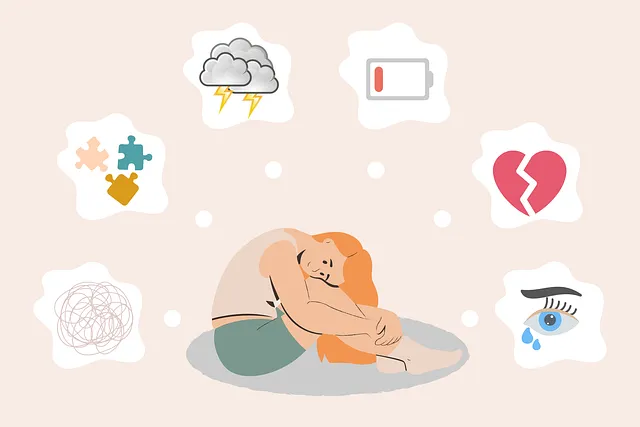The Kaiser Permanente mental health access center in Highlands Ranch leverages comprehensive risk management strategies to ensure high-quality care. From confidentiality protocols to crisis intervention training, they address unique mental health challenges. This includes cultural competency for diverse patient populations and advocacy for systemic well-being. Their holistic approach combines emotional intelligence, self-care practices, and trauma support services for professionals and patients alike, fostering a safe, supportive environment. Continuous monitoring, data evaluations, and collaborative training maintain the center's effectiveness in mitigating risks and enhancing care accessibility.
Mental health professionals face unique risks that require proactive management. This article explores the vital aspects of risk management planning, drawing insights from the Kaiser Permanente Mental Health Access Center in Highlands Ranch. We’ll delve into identifying specific mental health risks, developing comprehensive strategies, and implementing effective mitigation tactics. By understanding these key elements, professionals can enhance patient safety and foster a healthier work environment, utilizing resources like the Highlands Ranch center for optimal care.
- Understanding Risk Management in Mental Health Care
- The Role of Kaiser Permanente Mental Health Access Center, Highlands Ranch
- Identifying Risks Specific to Mental Health Professionals
- Developing a Comprehensive Risk Management Plan
- Implementing and Monitoring Strategies for Effective Risk Mitigation
Understanding Risk Management in Mental Health Care

Risk management planning is an integral part of providing quality care at the Kaiser Permanente mental health access center in Highlands Ranch. It involves identifying, assessing, and mitigating potential risks that may arise during the therapeutic process, ensuring a safe and supportive environment for both clients and professionals. Effective risk management strategies are tailored to address various concerns unique to mental health care.
This includes considering issues like client confidentiality, crisis intervention, and the impact of personal biases or triggers in the therapy setting. By implementing measures such as secure record-keeping practices, emergency response protocols, and providing resources for self-care and self-esteem improvement, the center creates a robust safety net. Additionally, community outreach program implementation plays a vital role in promoting well-being, fostering connections, and reducing risks associated with social isolation.
The Role of Kaiser Permanente Mental Health Access Center, Highlands Ranch

The Kaiser Permanente Mental Health Access Center in Highlands Ranch plays a pivotal role in supporting mental health professionals and fostering a robust support system within their community. This center acts as a comprehensive hub, offering a range of services tailored to address the unique challenges faced by mental health practitioners. By providing a safe and supportive space, it facilitates peer-to-peer connections and knowledge sharing among professionals, fostering a collaborative environment that strengthens their practice.
The center’s initiatives focus on preventing burnout, a prevalent issue within the mental health field. Through workshops and training sessions, they equip professionals with empathy-building strategies to enhance patient care and personal well-being. Furthermore, the center promotes Mental Health Awareness by organizing community events and educational programs, aiming to reduce stigma and encourage early intervention. These efforts contribute to creating a resilient network of mental health professionals, better equipped to navigate the demanding nature of their crucial work.
Identifying Risks Specific to Mental Health Professionals

Mental health professionals face unique risks that stem from the highly sensitive nature of their work. Unlike traditional healthcare providers, they often deal with deeply personal and often traumatic experiences shared by their clients. This can lead to secondary trauma, burnout, and emotional exhaustion.
At the Kaiser Permanente Mental Health Access Center in Highlands Ranch, we recognize these specific risks. Healthcare Provider Cultural Competency Training is crucial for navigating diverse patient populations and minimizing potential biases that could negatively impact care. Moreover, advocacy through Mental Health Policy Analysis allows professionals to push for systemic changes that support their own well-being and that of their patients, fostering a more holistic approach to mental wellness within the healthcare system.
Developing a Comprehensive Risk Management Plan

At the Kaiser Permanente mental health access center Highlands Ranch, professionals recognize that effective risk management is a cornerstone of quality care. Developing a comprehensive risk management plan involves a multi-faceted approach tailored to address unique challenges within the field of mental health. This strategy incorporates tools like emotional intelligence training to enhance clinicians’ ability to manage complex situations and mitigate potential risks.
By integrating self-care routine development for better mental health, professionals at the center ensure they can provide optimal support to their clients. Additionally, trauma support services are a critical component, designed to help both patients and practitioners navigate and overcome adverse experiences. This holistic approach not only safeguards the well-being of mental health professionals but also enhances the quality and accessibility of care at the Kaiser Permanente facility in Highlands Ranch.
Implementing and Monitoring Strategies for Effective Risk Mitigation

Implementing strategies for effective risk mitigation is a cornerstone of responsible mental health practice at centers like the Kaiser Permanente Mental Health Access Center in Highlands Ranch. This involves a multi-faceted approach that combines robust assessment protocols and proactive intervention techniques. By integrating compassion cultivation practices, professionals can enhance client safety while fostering an environment that promotes healing and growth. Regular monitoring and evaluation are crucial to ensure these strategies remain effective; data-driven insights enable practitioners to adapt their approaches, addressing emerging risks promptly.
Leveraging resources like Crisis Intervention Guidance tailored for the unique needs of mental health clients is essential. Such guidance facilitates timely responses to acute situations, minimizing potential harm. Continuous training and collaboration among team members further strengthen risk management capabilities, ensuring that all professionals are equipped with the latest research-backed techniques. This holistic approach not only safeguards clients but also enhances the overall quality of care provided at centers like Kaiser Permanente Highlands Ranch.
Mental health professionals face unique challenges that necessitate robust risk management strategies. By learning from centers like the Kaiser Permanente Mental Health Access Center in Highlands Ranch, which excel in this area, practitioners can create comprehensive plans to identify and mitigate risks effectively. A well-implemented risk management strategy not only protects professionals but also enhances patient care and ensures the sustainability of mental health services. Incorporating specific risk assessment and mitigation techniques is essential for navigating the complex landscape of modern mental healthcare.






